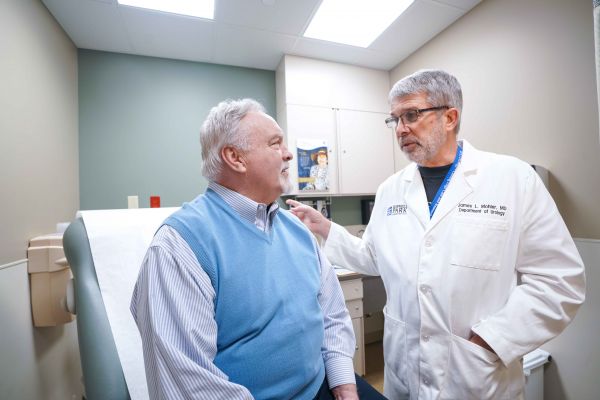You ask the internet a lot of questions, and Roswell Park has some answers.
How common is prostate cancer?
Prostate cancer is very common. There are almost 200,000 cases diagnosed each year in the United States. Approximately one in seven people will be diagnosed with prostate cancer during their lifetime.
What are the warning signs of prostate cancer?
Unfortunately, prostate cancer does not present with symptoms until it is in/at an advanced stage and likely incurable. Symptoms may include pain in your axial skeleton that gets worse over time. Some men with advanced prostate cancer also will present with a bladder outlet obstruction. They'll have difficulty passing their urine, and they may get up frequently at night to go to the bathroom. They also may have blood in their urine and may become unable to void.
This is why men must begin screening for prostate cancer with a digital rectal exam and PSA test, starting at age 45 (age 40 for those considered high risk) to catch prostate cancer before you have symptoms and is untreatable. Men age 70 and older should discuss with their doctor whether they need to continue PSA testing.
How do you check for prostate cancer?
Often prostate cancer doesn't present with any symptoms, so it's very important for men to get screened regularly in order to detect it early. This is done with an annual screening that typically starts at the age of 45. Men with a family history of cancer, particularly with a brother or father who had prostate cancer or a relative who died of prostate cancer, should begin screenings at age 40. African-American men also should begin screening at age 40.
The screening includes a PSA blood test and also a digital rectal exam to palpate the prostate and feel for any abnormal nodules. The two of these tests, when put together, are the most effective combination for screening.
Never miss another Cancer Talk blog!
Sign up to receive our monthly Cancer Talk e-newsletter.
Sign up!What is the PSA blood test?
PSA stands for prostate-specific antigen. The prostate makes PSA, but it's also made by every other cell in a man or woman's body. What physicians are interested in is when someone's PSA levels become elevated or when a PSA measured annually increases. PSA can be elevated for many reasons that are not prostate cancer, and prostate cancer also can occur even with a totally normal PSA. Unfortunately, this occurs more often with the rapidly progressing prostate cancers that can become metastatic. That is why it's important to have a prostate exam in addition to a PSA.
Is prostate cancer treatable?
Most prostate cancers in men are found using early-detection strategies. When prostate cancer is detected early, it is usually highly curable. In fact, more than half of men will have with low-risk prostate cancer for which the only treatment necessary is what's called active surveillance.
Most men can use active surveillance to monitor their prostate cancer. Only about 20% of these low-risk prostate cancers will ever progress to a need for treatment.
For the treatment of higher-risk prostate cancers, for which active surveillance is not an option, treatment can be done with an operation, a robotic radical prostatectomy, which is the removal of the whole prostate, and often with the surrounding lymph nodes. The alternative is radiation treatment that can be done either with seed implants or external beam radiation and can require 4-6 months of hormone therapy.
Is prostate cancer hereditary?
Prostate cancer appears to have a hereditary component, but that doesn't mean all prostate cancers are hereditary. We know that prostate cancers are a result of genetic mutations in the prostate, but we don't know if all those mutations are inherited or if some of them are just acquired during a lifetime due to exposures to carcinogens. About five percent of all cancers are inherited, five percent are purely environmental, and about 90% are a combination of the two, a gene-environment interaction.
In order to recognize men who are more likely to get prostate cancer, we rely on their known risk factors such as:
- You have a brother or father who has prostate cancer, especially if they were diagnosed under age 60 or 65, or a family member who has died of prostate cancer.
- You are an Ashkenazi Jew.
- You are an African American.
- You have certain, known inherited genes that cause an increased risk of cancer, the most common of which would be the BRCA1 and BRCA2 breast cancer genes. There's also a cluster of cancers called the Lynch syndrome that are cancers of the colon and rectum and are associated with ovarian cancers, prostate cancer and bladder cancer, which also could increase your risk.


